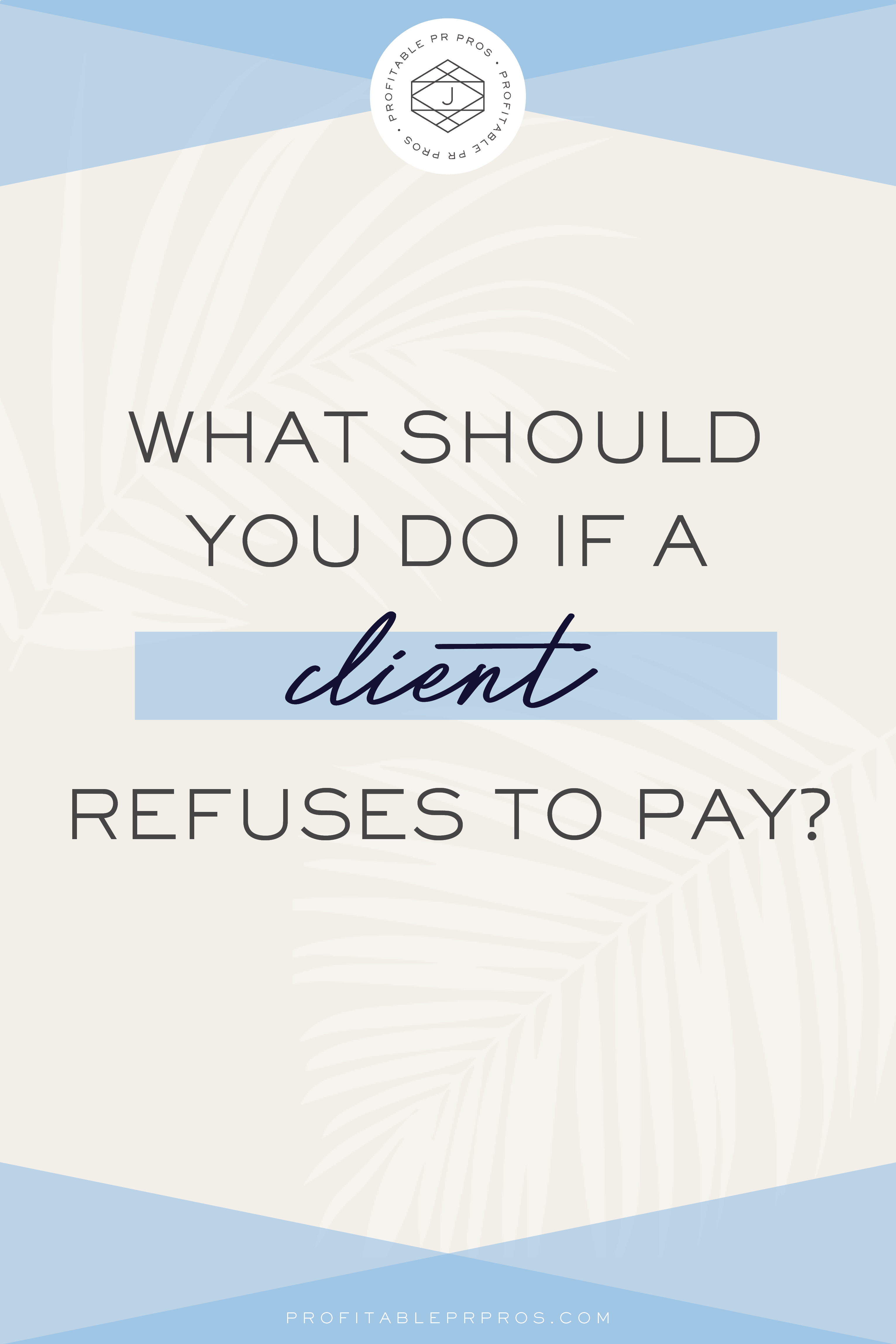What Should You Do If a Client Refuses to Pay?
Apr 26, 2021
What should you do if a client refuses to pay? To build a sustainable (and profitable) agency, you’ll need to develop consistent, predictable, recurring retainer revenue every month.
As a PR professional, your whole agency revolves around successfully working with clients...but what happens when things don’t really go as planned?
No matter how much skill or experience you have, at some point, you’re probably going to face the struggle of a client who refuses to pay. It’s an awful feeling, but instead of taking it personally, you need a plan in place for what to do if this happens.
So HOW do you actually move forward in a practical way?
Don’t Be Afraid To Say Something If a Client Refuses To Pay
Especially as you start growing in public relations, you might be afraid to approach a client about late payments. You might be nervous about annoying or upsetting the client, so you hold your tongue.
But here’s the truth: this is YOUR business. You deserve to get paid for the services you perform for your clients!
Your clients do not hold all of the power in your relationship. Instead, your relationships with your clients should be built on mutual trust and respect. That means your clients should be just as concerned with annoying or upsetting you by being late with their payments!
More likely than not, these situations can be easily solved with open communication.
What To Do If a Client Refuses To Pay
Let’s break down how to approach and communicate with your clients about a late payment (or multiple late payments).
Make Sure You Collect Payments Up-Front For Your Services
If you’re not already, know that you always need to have clients pay upfront for your PR services. This helps protect you and make sure that you aren’t left hanging on payments.
But sometimes, circumstances arise where you don’t receive payments on time.
Some clients have a longer payment runway than others—here’s what that means.
For small clients who repeatedly pay late, you may want to communicate that you will pause services until monthly invoices are paid.
If you have a bigger client with a huge retainer, you may want to continue working even if they haven’t paid yet. Be sure only to do this if you’re confident that the client will pay as they are supposed to. Otherwise, you do have to stop providing the services to protect yourself.
Related: Top Mistakes PR Agency Owners Make That Are Costing Them Time, Revenue, (And Their Sanity)
Follow Specific Communication Steps
Communication is vital in maintaining client relationships. But what happens when you’ve already been communicating, and still a client refuses to pay?
Let’s say you’ve submitted multiple invoices that have gone unpaid, and you’ve already approached a client about late invoices. If a client gave you a timeline for when it would be paid, maybe you proceeded with services anyway.
But now, you’re struggling with multiple late invoices, and you’re ready to send another invoice.
Here’s how to deal with this situation.
Let your client know that you’re getting ready to submit another invoice and reiterate that you haven’t received payment for the others.
Politely remind them that this goes against the terms of your agreement and that you’ve already followed up multiple times to find a solution.
From there, respectfully let the client know that you’ll need to cease your services if the late invoices aren’t paid within one week. You can end the message, phone call, or email by letting your client know that you’re in a difficult situation that you hope can be resolved quickly.
Your clients will always appreciate open, respectful communication. That’s why it’s essential to continually follow up, even if it makes you uncomfortable!
Remember That You Deserve Respect, Too
I want you to remember that as a service provider working with clients, relationships should be mutually beneficial!
You should be getting just as much value as your client is getting from you. And this isn’t just measured in dollars—it’s also measured in reliability and respect. If you have continually provided your deliverables and communicated your expectations for payments, and clients aren’t responsive, it’s time to take a stand.
If a client refuses to pay, saying something will feel difficult—but it is absolutely necessary.
Plus, you saying something will light a fire under your client. If you’re doing your job right, having you around makes their jobs easier… which means they should want to keep you happy (and paid)!
What To Do For Breaches of Contract
What if a client refuses to pay and tries to back out of a contract that was for a set amount of time?
Consider pursuing payment for the work that you’ve already done. But usually, I don’t recommend going after a client for the total amount of the entire contract.
This gives you some leverage to use in that conversation. Let your client know that you’re willing to terminate the contract early and waive the damages, but only if you’ve paid for the work you’ve already done and a fee for exiting the contract early.
This is also something you can consider building a clause for in your initial contract. In Jeneration PR’s contract, we have “liquidated damages,” which outlines what a client owes us for breaching a contract early.
If you do the work, you deserve to be paid for the work. But sometimes, it’s easier just to let a client go….make these decisions on a case-by-case basis.
Here are some ideas from members of our community:
- Add an “early termination fee” equal to one month’s retainer paid in full
- Require the payment of the first and last month of the retainer upfront
- Put client credit cards on file so that invoices cannot be paid late; instead, you’ll just bill the credit card whenever invoices are due
When To Take Legal Action If A Client Refuses To Pay
So, if a client refuses to pay, when should you consider legal action?
If a client is not in a position to pay, there’s nothing you can do, and it’s likely not worth it to pursue legal action. You could try pursuing small claims, but it will always be more expensive long-term if you have to hire an attorney.
That’s why it’s so essential to be careful about who you select as a client.
In most cases, it’s better to walk away from a client than to pursue legal action. Instead of spending your valuable time, money, and energy fighting to be paid by a client that didn’t work out, start vetting new clients and working to grow in other ways.
Adjust Your Mindset Surrounding Your Clients
One of the most important ways to avoid this situation is to vet your clients thoroughly and change your clients’ mindset.
Your goal shouldn’t be to work with as many clients as possible.
Instead, you need to focus on finding the right clients who respect you, value your work, and are willing to pay exactly what you deserve.
Make sure you only say yes to the clients who are the best fit for you! When you properly vet your prospective clients, you’ll be less likely to encounter a client refusing to pay.
You should only work with clients who value you and won’t have any issue paying your worth. For more tips on identifying, finding, and landing your ideal clients, consider joining The Agency Accelerator! We go in-depth on how to vet your clients and avoid this uncomfortable situation.
It’s never a good experience when a client refuses to pay. But with these tips on your side, you’ll know how to move forward strategically. The most important way to avoid these situations is knowing how to vet your clients and find those ideal clients who’ll pay what you deserve!







